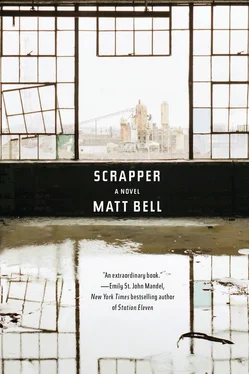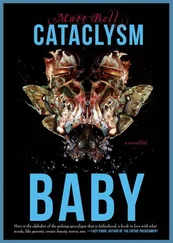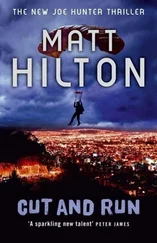There had never been a pet to call your own. You weren’t afraid of dogs but didn’t see the draw.
Once a woman threw a coffee at you in a fast-food lobby and you never knew why. Sometimes you found yourself in line somewhere with an erection that wouldn’t go away. Then the long bus rides, the hands over the lap trying to hide your discomfort, leaving behind an ache you didn’t know how to soothe. Or you knew how others soothed it but you didn’t know how you should. It hurt too much to touch it yourself and you didn’t know how to ask someone else. In the group home you had watched other boys handle themselves in the darkened dormitory, watched their faces as they moved through the pains of pleasure. One night you had gone to one of those boys and asked for help, had begged for it. The other boy had punched you in the neck and in the ear, had knocked you to the ground and pressed your face to the linoleum floor. There were words to make him stop but who knew which words you screamed were the right ones.
It should have been enough to keep your hands to yourself, to not ask for others’ hands upon you. It should have been enough for you to watch. You had not wanted to go further.
This was the self you were bringing into the light: the one who wanted to stare out from behind the mask of new name, home haircut, hooded garment. Who looked at the world as it was and who only wanted to make the world look back.
THE CALL HAD COME FROM her number but it was her co-worker who’d answered. The co-worker said she wanted Jackie to go to the hospital but Jackie wanted to drive herself home instead. Calling him was their compromise. The building where she worked wasn’t what he expected but he wasn’t sure he’d had an expectation. The life they shared when they were in the same room was all he had of her. No shared past, no shared present outside of her apartment, his, the bars they drank in, the diners where they took their meals.
It was easy to forget. He saw a woman every day, shared a bed and a table until he thought he knew her, until she might imagine she knew him back. But what proportion did he know, what was the ratio between known and unknown. She saw him with the boy but so far the boy was his. She told him about her week but to him her experiences were mostly stories, as distant as the news.
When he arrived he found her sitting pale faced in her cubicle, clutching the edge of the desk as if she might fall out of her chair, the screen before her blank, every emergency in the city redirected. There was medication she was meant to take when this happened but he couldn’t remember its progress, if her dilated pupils meant she had swallowed her pills.
What did you say when you couldn’t say Are you okay. What did you say when you couldn’t say What’s wrong.
It was impossible to get her into his truck in her clenched condition so they would take her car instead. First the excruciation of pacing her slow progress, stooped and dragging toward the exit, because she refused to use her cane at her workplace, in the company of others. The elevator was farther than the stairs but the stairs weren’t an option. He put his arm around her and she cursed but as the doors slid closed she crumpled against him. When the doors opened onto the ground floor, she shoved herself free, used the elevator’s railing to yank herself upright.
In the parking lot, he offered to bring the car around and she glared again, pulled away.
He said, You can let me help you. There’s nothing wrong with letting someone help.
She scoffed, swore. She said, The last thing I need is you carrying me to the car. And who are you to talk about needing help.
He stopped walking but she kept going, didn’t look back, didn’t speak. He waited but she didn’t slow. She limped beneath the parking-lot lights, her shadow stretching her stagger. He caught up to her, didn’t let her walk alone. The attacks were coming faster now. Long ago she had said there wouldn’t be rhyme or reason but for Kelly there was no denying their increased frequency. She didn’t want him to carry her and wouldn’t take his arm but she let him stand beside her, let him match his pace to hers. She wouldn’t fall this time but it didn’t mean he couldn’t promise to catch her if she did.
W
He started to watch more closely, until every day he discovered some previously secret aspect of her life. Hobbies he didn’t know she had. A circle of friends he hadn’t met. In their earliest days they were always together and so there hadn’t been room for outside interests. He no longer spent every evening in her company and so she had returned to her life before him. He called her and she was out with the other women from work, drinking beer and playing pool. He called her and she was home, watching the hockey game by herself, or else he called her and she was at their usual bar, watching the game in the company of others. She hadn’t ever talked about books before but now he often found library books on her coffee table.
He picked up a murder mystery, flipped it over to read the jacket copy. A serial child abductor on the loose, an unlikely detective tasked to take him down. She brought him a beer from the fridge, put her hand on his chest. She took the book from his hands and put it back on the table.
It doesn’t mean anything, she said.
She liked the order, she said. She liked the way the evil in these novels was a solvable mystery temporarily unsolved. The guilty could be found, accused, punished. When a woman made a mistake, the woman could redeem herself. The world of her novels was not chaos but merely the appearance of chaos. Instead there were hidden systems, mechanisms that could be uncovered, put to use. The righting of the bad world. A point to suffering, a suffering that improved the sufferer. Three hundred pages and an expectation that by the end all the answers would be revealed. The transfer of weight as the pages fell from the right hand to the left, an accumulation of certainty.
I fell asleep reading last night, she said, and then I dreamed I was still reading but in my dream the room I was in was too dark for me to see the words. When I closed my book the dark got darker. I left the house, got in my car, started to drive. There was a lot of traffic but it dwindled as the road narrowed. When I passed the last car I realized my headlights were broken, that without other cars there would be nothing left to light the way. And then the last lights went out: streetlights off, moon gone, stars vanished. And I could not stop driving so very fast.
The reward should have made escape possible. He could have gone anywhere else, another city, a town. A simpler place for a simpler life. Now there was Jackie, there was the boy, there was the case, necessary to solve — but also his television, his couch and chair, all his possessions nothing special, only his . In the South he had owned a house full of such objects — or he had almost owned it — or else he had been only the completer of paperwork, the mailer of checks. Other people thought escape was something you did but Kelly knew it was an accretion of small choices, an action you earned. He worked and he drank and when he could he drove the streets of the zone, he checked his lists in the case notes, his homemade maps. A haphazard survey of the city no one wanted. More and more he wore the orange jersey underneath his coat. He kept his doors locked, smoked with his windows up, rolled through stop signs if there were men lingering on the corners of the street. Wherever he went he wore heavier layers, t-shirt, flannel, hood and coat and hat and gloves, thermal underwear under heavy pants tucked into insulated boots, but he arrived back in his apartment shaking, his fingers blue, all his skin full of needles and steam.
Читать дальше












